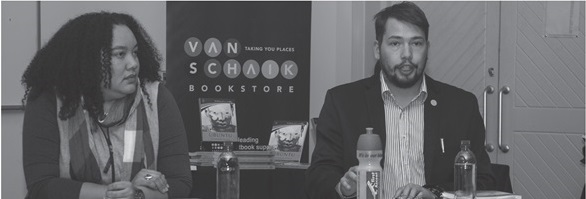
The panel discussion entitled Is Ubuntu dead? brought together academics and audience members in a conversation about the merits and limitations of the Ubuntu philosophy. Chaired by Rhodes University Anthropology lecturer, Dr Joy Owen, the discussion centred on works by Professor Leonhard Praeg and Siphokazi Magadla, both of whom lecture in the Rhodes Politics department. The discussion focused on the philosophical and practical elements of Ubuntu, and the ways in which a re-imagined Ubuntu could be applied towards greater equality in contemporary South Africa.
"Ubuntu was reduced, in the time of transition, to just being nice. But it is not an expansive forgiveness, it has limitations," explained Praeg, who has produced two works on the subject, and teaches the subject Ubuntu as a 3rd year Politics course.
The discussants described a more difficult, and sometimes harmful version of Ubuntu through its application in South Africa since the TRC, in the form of "Ubuntutu". There was clear agreement, however, that a re-imagined Ubuntu could be useful for renegotiating power dynamics that emerge in every day life.
Nosipho Mngomezulu, who deals with the Student Volunteer Programme at Rhodes University, was also on the panel. She added that Ubuntu is central to understanding how communities interact.
"Thinking about Ubuntu in practice means thinking about what "we" means. How do my students begin to see themselves as part of the broader community, rather than just Grahamstown West? Because we are entangled," she said.
The audience members engaged the panel throughout the discussion, describing their personal approach to Ubuntu. The central concern seemed to centre on whether Ubuntu simply exists in society and in all people or whether it is a learned philosophy that must be practised.
"This is a moment of rupture. This Kenny Kunene version of success is wholly understandable. Ubuntu is an invitation. We are being invited to look back in order to move forward," said Magadla.
From the discussion, it would seem that Ubuntu is not dead, but simply being re-incarnated for the current context and towards emancipatory ends. It remains at the center of lived experience in Africa and will likely continue to be invoked across social institutions. How do my students begin to see themselves as part of the broader community, rather than just Grahamstown West? Because we are entangled. Panel discussion chair, Joy Owen, and panellist Aidan Prinsloo at the Is Ubuntu dead? debate.
Article Source: Cue
Article by: Binwe Adebayo
Photo: Hlumela Mkabile
